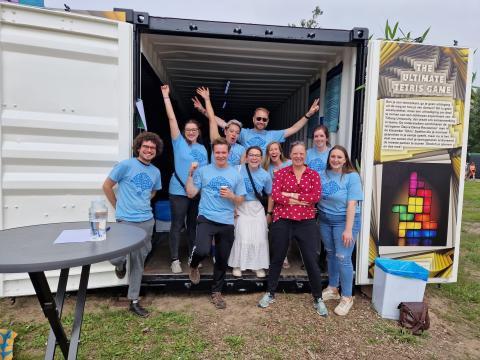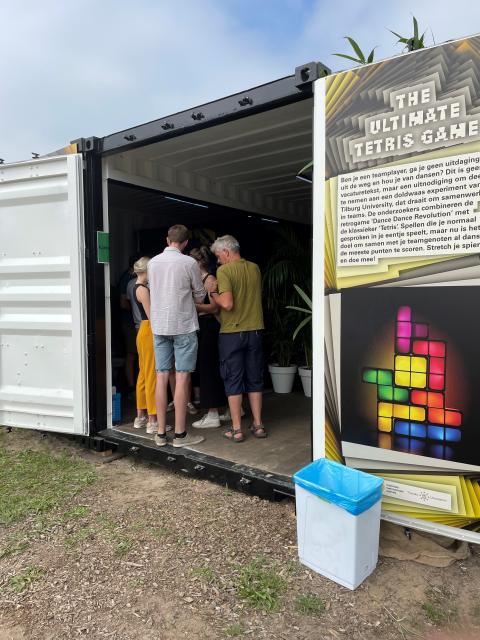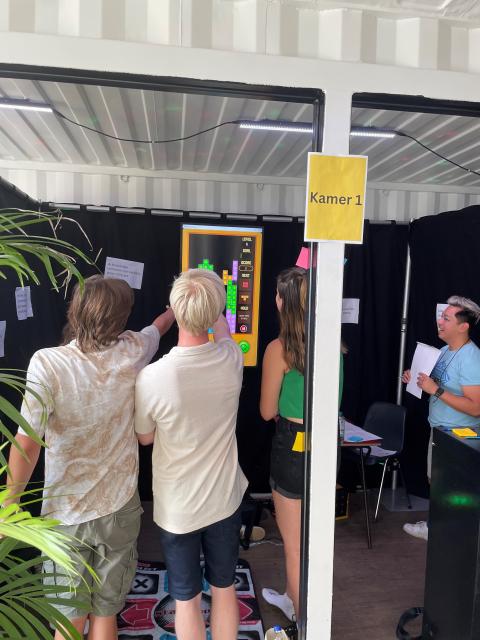Team collaboration in a game of Tetris: A Lowlands science experiment
How effectively do people work together in a team? What impact does that have on feelings of stress and burn-out and on team performance? Do specific inclusion interventions affect individual feelings of inclusion, stress, and burnout and team performance? Ten researchers from TSB (the Departments of Human Resource Studies and Medical & Clinical Psychology) conducted research this past weekend at a sweltering hot Lowlands Science site. They asked visitors of the Lowlands music festival to play a game of Tetris under different conditions. This yielded data of 85 groups: a unique opportunity to do research in a very dynamic environment.
Lowlands visitors as a unique population
With 65,000 visitors, Lowlands is one of the larger festivals in the Netherlands. In addition to music, there is Lowlands Science, where different research universities, universities of applied sciences, and other research institutions conduct various studies. In an open call, researchers were invited to apply for participation in Lowlands Science by presenting their research project. Abbie Bailey decided to take the plunge, assembled a team of researchers, submitted an application, and was accepted for Lowlands. In a construction trailer in the Lowlands grounds, she collected data of approximately 340 participants with nine colleagues over three smoldering hot days. The purpose of the study was to assess whether different inclusion interventions promote team collaboration and team performance. The Lowlands visitors are a unique population that is not usually surveyed in regular HR research.
Combining diverse types of expertise
The Tilburg University team consisted of Abbie Bailey, Amber Kersten, Yuri Scharp, Tom Junker, Jamie Breukel, Panna Kerti, Jason Jie, Mahi Spanouli, Ellen Bouwmans, and Peter Hermans. In their experiment, the researchers combined their different types of expertise. For instance, Abbie Bailey is interested in interventions that can reduce stress in a team. Jamie Breukel’s research is about inclusion, and Tom Junker is conducting research into teams and team dynamics. Peter van Trier (LIS) provided IT support.

Playing Tetris with a group in three different situations
As part of the experiment, participants in a group of four played a game in the construction trailer using a foot mat as a game controller. Groups played in three different situations. In situations 1 and 2, an inclusion intervention took place before participants played the game. In the first situation, participants were invited, before the game, to discuss how they should behave to achieve an optimal score (‘rational’). In the second situation, participants talked about who they are, what their strengths were, and how they could best use their personal qualities to achieve a high score (‘emotional’). The third situation was the control group. Participants in this group did not get any specific intervention, but were simply invited to get acquainted with each other. Groups were randomly divided over the situations. In total 850 minutes of Tetris were played.
Multilevel data: Individual and team
Before they played the game, participants completed a questionnaire on their demographic characteristics, (individual) feelings of inclusion in the team, and stress and burn-out. Every participant also took a breathalyzer test to measure blood alcohol content (often to the great amusement of the group). After the games, often played with great enthusiasm and determination, the participants again completed a questionnaire on inclusion, stress, and burn-out. The Tetris team score was also noted. Eventually, more than 300 participants played a game of Tetris. This provided data on 85 teams. The data will be analysed in the coming period.


Making it easier to talk about diversity and inclusion
It was striking that participants were generally open and enthusiastic and had fun playing Tetris. In organizations, diversity and inclusion are perceived as heavy and difficult subjects and are treated as such in discussions on the subject. The Lowlands experiment shows that there are other ways to address the subject – in a playful game setting. “And if this works in a chaotic and sweltering setting like Lowlands, then it will certainly work in an organization. Wouldn’t it be great to implement this in an organization,” says initiator Abbie Bailey.
Importance for society and for the university
Vice-Rector Magnificus Jantine Schuit visited the Lowlands Science site last Friday together with the rectors of other universities. ‘We think it is wonderful that our scientists introduce the festival visitors to our research. And at the same time it provides us with unique new data from young people who, as a rule, are not easy to reach. I was really impressed by the Tilburg study, whereby this game gives us insight into the effectiveness of team collaboration, because collaborating in teams is also important for the university.’
